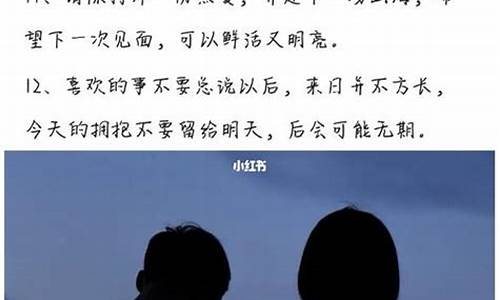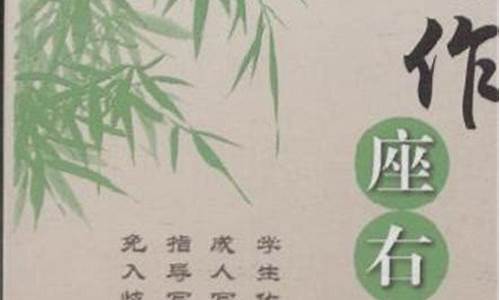您现在的位置是: 首页 > 励志语录 励志语录
初中英语重点句子及翻译_初中英语重点句子翻译大全
tamoadmin 2024-09-12 人已围观
简介1.英语句子摘抄及翻译2.初中英语 翻译句子3.各位英语高手,能帮我翻译几个初中英语句子吗?悬赏20分!4.初中英语翻译5.翻译几个初中英语句子,不要用在线翻译。在线等翻译词组:1.吃垃圾食品1.eat junk food2.喝牛奶2.drink milk3.吃水果eat fruit4.和咖啡drink coffee5.吃蔬菜eat vegetables6.想睡觉want to sleep7.对身
1.英语句子摘抄及翻译
2.初中英语 翻译句子
3.各位英语高手,能帮我翻译几个初中英语句子吗?悬赏20分!
4.初中英语翻译
5.翻译几个初中英语句子,不要用在线翻译。在线等

翻译词组:
1.吃垃圾食品
1.eat junk food
2.喝牛奶
2.drink milk
3.吃水果
eat fruit
4.和咖啡
drink coffee
5.吃蔬菜
eat vegetables
6.想睡觉
want to sleep
7.对身体有好处
be good for health
8.对身体有害处
be bad for health
9.一天5或6次
five of six times a day
10.一月1或2次
once or twice a month
汉译英。(句子)
1.我想吃饼干
I want to eat biscuits.
2.他想和可乐
He wants to drink cola.
3.他们想要我回家
They want me to go home.
4.他想让我帮他
He wants me to help him.
5.BILL想要你不要站在这儿
Bill wants you not to stand here.
6.蔬菜对我们的健康有好处
Vegetables are good for our health.
7.垃圾食品对你的健康有害处
Junk food is bad for your health.
8.他有多少本书
How many books does he he?
9.你每天看多少节目
How many programs do you watch every day?
10.你想要多少肉?
How much meat do you want?
11.你每天喝多少牛奶?
How much milk do you drink every day?
句型转换
1.Meimei does her homework every day (就every day 提问)
How often does Meimei do her homework?
2.My father usually surf the Internet (就surf the Internet提问)
What does my father usually do?
3.There are no books on the desk (同义句)
There aren't any books on de desk.
4.I sleep 8 hours every night.(就8 hours 提问)
How long do you sleep every night?
5.Alice often does her homework at 7:00.(变否定句)
Alice doesn't often do her homework at 7:00.
6.The boy drinks milk once a day.(就 once a day 提问)
How often does the boy drink milk?
7.I write to my father twice a month.(就 twice a month提问)
How often do you write to you father?
……这是初二的题么,小学四年级差不多吧
英语句子摘抄及翻译
来自于(两种)come from/born in 打扰一下 excuse me
你的笔友 your penfriend 多大了 hou old are you
在东京 in tokyo 保持安静 keep silence
讲英语 speak English 在白天 in daytime
对……感兴趣 每一天 be interested in/every day
多少岁 工作到很晚 What's your age? / work till very late
在八月 工作很辛苦 in August / work very hard
一点;少许 与人们交谈 a little(few) / talk with others
在英国 写故事 in England / write story
去看** 去看** go to see a film /
做运动 给……打电话 do some exercises/call sb.
给某人写信 看电视 write sb./watch TV
她最喜欢的科目 读报 her forite subject/read newspapers
在学校 做作业 at school / do one's homework
每逢周末 谈论…… every weekend/ talk about...
告诉某人某事 我的一张家庭照(两种) tell sb.sth.
my picture of my family/ a family picture of mine
喜欢做某事 踢足球 like to do/ play football
在右边 在学校 at right / at school
在左边 在游泳池 at left / in the swimming pool
在第五大街 在家 in the fifth street/at home
在中央大街 为……而感谢 in the center street/thanks for
在附近 吃晚饭 at nearby/ he dinner
在他右边 玩电脑 on his right/play computer games
在图书馆对面 打篮球 at the opposite of the library/play basketball
一直走 看电视 go straight/watch TV
向左转 读书 turn left/read books
向右转 感到惊讶的 turn right/feel surprised
不用谢 在度 not at all/ on holiday
一条安静的街道 拍照 a silent street/take photos
紧挨着银行 躺在沙滩上 next to the bank/lie on the beach
在你左边 看起来很酷 on your left/looks very cool
散步 紧挨着学校 he a walk/next to the school
在邮局和餐馆之间 一群人 between the post office and the restaurant a school of people(school有一群的意思)
欢迎到花园 玩得快乐 welcome to the garden/he fun
在旅馆后面 在一家医院工作 behind the hotel/work in a hospital
穿过公园 玩沙滩排球 go across the park/play bach volleyball
去我家的路 在旅馆和商业街之间 the way to my home/between the hotel and the business street
在超市前面 对……感到惊奇 in front of the supermarket/be surprised of...
玩得快乐 谈论 he fun/talk about
让某人做某事 在狮子的对面 make sb. do sth./on the opposite of the lion
在格林大街 一个非常有趣的地方 at
乘出租车 来自于 by taxi/come from
沿着桥大街走 天气(两种) walk along the bridge/ weather或者climate
旅途愉快 事情进展 he a good trip/the things goes...(process of the thing)
篮球队长 中国美食 captain of the basketball team/Chinese food
中等身材 动物世界 suitable figure/the animals' world
短而直的头发 实话实说 short and straight hair/tell the truth
一点害羞 周末访谈 a bit shy/the interview on weekends
一点重 一个13的男孩 a bit hey / a 13 year old boy
从不停止讲话 给……看…… never stop talking/ show……to……
棕色卷曲的头发 询问…… brown and curl hair/ ask for...
新形象 最酷的东西 new image/ the coolest thing
戴眼镜 在下个月的杂志里 wear glasses/in the magazine of next week
什么种类的面条 你认为……怎么样 what kind of noodles/how do you like……
牛肉西红柿面 不得不 beef and tomato noodles/he to
一大碗半肉面 穿运动鞋 a large bowl of beef noodles/wear sport shoes
一中碗西红柿鸡蛋面 去少年宫 a middle bowl of tomato noodles/go to the children's palace(hall)
一小碗米饭 不许讲话 a little bowl of rice/don't talk
一大杯绿茶 在走廊里跑 a big cup of red tee(注意,绿茶在英语中是red tea)/run in the corridor
一小杯橙汁 上课迟到 a small cup of juice/be late for class
鸡蛋和面 在教室里吃东西 eggs and cabbage noodles/eat in the classroom
羊肉土豆面 放学后 mutton and potato noodles/after school
牛肉胡萝卜面 穿校服 beff and carrot noodles/wear school clothes
上周末 打扫教室 last weekend/clean the classroom
在周一早上 听音乐 on Monday Morning / listen to the music
留在家 在上学日的晚上 stay home/on the night of school days
为考试而复习 体育馆 go over for the exam/the gymnasium
拜访我的姑姑 看电视 visit my aunt/watch TV
拜访我的叔叔 太多规则 visit my uncle/too many rools
学地理 在6:00起床 learn geography/get up at 6 o'clock
该到……的时间了 每天早晨 it is (high) time to do.../every morning
留在家 会见我的朋友 stay home/meet with my friends
去纽约市 每逢周末 go to the New York city/every weekend
去夏令营 洗衣服 go to the summer camp / wash clothes
去爬山 帮某人做某事 clime the mountain/help sb. do sth.
去海边 做晚饭 go to the seaside / make dinner
参观博物馆 禁止泊车 visit the museam/no parking
去购物 禁止吸烟 go shopping/no smoking
有点无聊 禁止扔垃圾 a bit boring/no rabbish
游戏节日 骑自行车 game festival/ride a bike
实际上 禁止拍照 in fact/no phtographing
同意……的意见 agree with...
怎么样(2) how about/how do you like..
欢迎到…… welcome to..
今日英语 today's English
体育新闻 sports news
健康之路 the way of health
中国文化 Chinese culture
呼呼。。搞定啦,希望能帮到你。
初中英语 翻译句子
给你摘了一些,你每个抄15个就好
被动态
例:1、主动:The children ge the foreign guests a warm welcome.
被动:The foreign guests were given a warm welcome by the children.
孩子们热烈地欢迎外宾。
2、主动:People regard him as brilliant.
被动:He is regarded as brilliant by people.
人们认为他很有才华。
以上两例都是一般时态用be done的例子,be有人称、时、数变,第三人称foreign friends是复数,时态一般过去时,所以"be done"就是were given,而People regard him as brilliant一句,被动后的"be done"就变成单数第三人称is regarded的形式了。
被动:
This speech was delivered by comrade Wang. (was delivered即一般过去时的被动态)
这篇讲演是王的发言。
There was a serious train accident near the border. Two people were killed and twelve were injured.
边境发生严重列车事故,二人死亡,十二人受伤。
A person who is truly honest is called a straight arrow. 直言不讳的人才是真正诚实的人。
A note was passed up to the speaker. 有人给讲演者递上来一张纸条。
John was elected president of the class instead of Harry. 乔治被选为班长而代替了亨利。
The information is urgently needed. 急需这个资料。
完成时态he done,被动将been加中间。
(过去完成时had done也包括在内)。
例:1、主动:We he studied English for 3 years off and on at the spare-time school.
被动:English has been studied for 3 by us years off and on at the spare-time school. (he随新主语变为has)
我们已经在夜校里断断续续地学了三年英语了。
2、主动: They had produced 100 tractors by the end of last year.
被动: 100 tractors had been produced by the end of last year.
到去年年底我们已生产出一百台拖拉机。
3、主动:They he set up a power station in their home town.
被动:A power station has been set up in their home town.
他们的家乡建立了一座发电站。
4、主动:They he warned us to be careful of rats.
被动:We he been warned to be careful of rats.
他们已提醒我们要注意老鼠。
5、主动:People he piled plastic bags full of rubbish in streets.
被动: Plastic bags full of rubbish he been piled in streets.
人们把装满垃圾的塑料袋子堆放在街上。
6、主动:We he used nuclear energy to produce electricity.
被动:Nuclear energy has been used to produce electricity.
核能已用来发电。
7、主动:No one has ever beaten him at tennis.
被动:He has never been beaten at tennis.
就网球来说还没有人是他的对手。
(No one涉及到全否定和部分否定问题,见否定一讲)
The subjects of these lectures he been announced by the lecture committee.
演讲委员会已宣布了这些讲演的题目。
过去完成时也是一样:
主动: Somebody had cleaned my shoes.
被动: My shoes had been cleaned by somebody.
有人早已把我的鞋子擦了。
他们将问你许多怪题。
被动句中的by引出的宾语,一般说来,如果是人称代词你、我、他等,均可省略,someone no one不由by来引出。如果是名词不能省略,但当今英语也都可省略了。
主动:The Chinese people will make more space explorations in the future.
被动:More space explorations will be made in the future by the Chinese people.
中国人民在将来将进行更多的空间探索。
同样
After a period of use, the batteries should be changed. 电池使用一段时间后,应该更换。
Usually, the electricity is on for 24 hours. But tomorrow it will be cut off in the day time. 通常是昼夜供电,明天白天将停电。
More peaceful uses will be found for nuclear explosives in the future. 在将来会发现更多的和平利用核爆炸的途径。
More hard work will be needed to make this wonder come true in a short time from now. 从现在起要使这些奇迹在短时间内成为现实还需要做更多的艰苦工作。
make..e true 使……成为事实; come true做宾补(见感使动词口诀)。
The machine will not be used again. 这机器不能再用了。
反义疑问句
一、There be 句型陈述句比较特殊, 其附加疑问句的结构为there be的倒装,而不带句子主语。例如:
There is something wrong with the computer, isn't there? 这台电脑有点毛病,是不是?
There aren't any fish in the river, are there? 这条河里没有鱼, 是吗?
二、当陈述部分的主语是everyone,everybody, someone, nobody, no one,none, anyone, somebody等合成不定代词时, 在非正式文体中,附加疑问句中的主语通常用he或they。例如:
Someone opened the door, didn't he/they? 有人开了门,是不是?
Nobody went to the cinema, did they? 没人去看**,是吗?
三、当陈述部分的主语是everything, nothing, something, anything等合成词,附加疑问句中的主语用it。例如:
Nothing serious hened, did it? 什么事情也没有发生,对吗?
Everything is ready, isn't it? 一切准备就绪了,不是吗?
四、当陈述部分的谓语动词是am的肯定形式时,附加疑问句的谓语动词用aren't,而不用am not;当陈述部分的谓语动词为am not时,附加疑问句的谓语仍用am。例如:
I am five years younger than you, aren't I? 我比你小五岁,不是吗?
I am not late, am I? 我没有迟到,对吗?
五、当陈述部分带有few, little, hardly, scarcely, rarely, seldom, never, nowhere, nothing, no one, nobody等表示否定或半否定意义的词时,附加疑问句的动词用肯定形式。例如:
The old man can hardly read, can he? 这位老人不识字,对吗?
Little food has been left, has it? 吃的东西几乎没剩下,是吗?
He has few good friends, has he? 他几乎没有要好的朋友,是不是?
六、当陈述句部分带有否定前缀的词时,此陈述句当作肯定句, 其后的附加部分用否定形式。例如:
The students were impolite, weren't they? 那些学生没有礼貌,不是吗?
It's illegal to drive a car without a license, isn't it? 没有驾照开车是违章的,不是吗?
※ 含有否定含义的词在陈述部分作动词的宾语时,其反意疑问句用肯定结构,也可以用否定结构。例如:
You got nothing from him, did you? 你从他那儿什么也没得到,是吗?
七、如果陈述句是主从复合句而主句的谓语是动词I(we) + think, believe, suppose, imagine, reckon, fancy等词时,附加部分应与从句中的谓语在时态上保持一致。例如:
I suppose you are not serious, are you? 我想你不是当真吧,是吗?(不可用don't I?)
We think they he finished their homework, hen't they? 我们认为他们已经完成了家庭作业,不是吗?
I believe that you will enjoy the party, won't you? 我相信你会喜欢这次聚会的,不是吗?
八、当陈述部分是祈使句时,附加部分可以不与前面的祈使句的动词保持一致,而是根据不同的用意选用shall, will, can 等。例如:
Don't make noise, will you? 不要吵闹,行吗?
Let's help each other, will you/won't you? 让我们互相帮助,好吗?
Let me do it for you, will you/won't you? 让我来帮你做这件事,行吗?
Let us he a look at your new dictionary, will you/won't you? 让我们看一看你的新词典,好吗?
〔注〕Let's(包括说话者本人)开头的祈使句,附加部分常用shall we?或shan't we? 表示征求意见。 Let us/me/him不包括听话人在内开头的祈使句,附加部分则要用will you?或won't you?
倒装句
A. 在疑问句中
各种疑问句一般地说都是倒装语序。例如:
Will they come to see us this weekend ? 这个周末他们将来看我们吗?
Are you talking about the film you saw last Monday ?
你们是在谈论你们上周一看的那部**吗?
Can you speak another foreign language except English?
除开英语,你还能说另一种外语吗?
Where did you buy the dictionary, in the book store nearby or in Xinhua bookstore?
你在哪儿买的这本词典,是在附近的书店还是在新华书店?
She is not a student, isn't she ? 她不是个学生,对吗?
B. 在感叹句中
某些感叹句也用倒装语序。例如:
Isn't it a beautiful garden ! 多么美丽的花园啊!
What a beautiful garden it is ! 多么美丽的花园啊!(在这种句式中,主语在谓语之前,属于自然语序。对于主语和谓语而言,语序没有倒装。)
He you ever seen such a naughty kid like him !
你见过那个孩子像他这么调皮!
C. 在陈述句中
陈述句在一般情况下用自然语序;但由于英语语法的某些原因,陈述句也要使用倒装语序。这些原因大致可以归纳如下:
1) 为了避免句子部分内容不必要的重复,常用"so + be动词(助动词、情态动词)+主语"或"neither / nor + be动词(助动词、情态动词)+主语"的倒装句式。其中第一个句式表示"与前面所述的肯定情况相同", 第二个句式表示"与前面所述的否定情况相同"。例如:
His brother is a college student; so is mine.
他弟弟是大学生,我弟弟也是。
His brother is not a college student; nor is mine .
他弟弟不是大学生,我弟弟也不是。
He used to he his further study abroad; so did I.
他曾去国外深造过,我也去过。
He didn't use to he his further study abroad; neither did I.
他没去国外深造过,我也没有。
One of my friends can speak three foreign languages; so can his wife.
我的一个朋友会说三门外国语,他的妻子也会。
One of my friends cannot speak three foreign languages; neither can his wife .我的一个朋友不会说三门外国语,他的妻子也不会。
They are now preparing for their final examinations; so are we .
他们正在为期末考试作准备,我们也一样。
They are not now preparing for their final examinations; nor are we .
他们没在为期末考试作准备,我们也没有。
定语从句
四、定语从句中的主谓一致的问题
在定语从句中,当关系代词在定语从句中做主语时,谓语的数由先行词决定;当先行词为oneof+复数名词,定语从句中的谓语复数;当先行词为the(only,very,last)oneof+复数名词,谓语用单数.
①This is the last thing that interests me.
②That is one of the rooms that are free now.
③He is the only one of the students who is interested in sports.
五、当way做先行词时,后面跟的定语从句缺少状语时,关系词可以使用that,in which或者不加关系词
I didn't like the way that he eyed me.
I didn't like the way in which he eyed me.
I didn't like the way he eyed me.
六、在非正式文体中,在place,time,day,reason等词的后面的定语从句,即使定语从句缺少宾语,关系副词可以省略或者使用关系代词that.
This is the place (where/that) we met yesterday.
I shall never forget the day (when/that) we first met.
The reason (why/that) he came so early is his own affair.
Do you know the right time (when/that) the meeting begins?
七、which、whose引导定语从句在从句中做定语时,也能做介词宾语
It rained all night and all day,during which time the ship broke in pieces.
I called him by the wrong name,for which mistake I should apologize.
The prince was the person in whose honor the ball was given.
八、一般情况下,定语从句紧接先行词,但是有时为了保持句子的平衡,定语从句可以后置。
例如:The day will come when the people all over the world will win liberation.
when引导的定语从句修饰the day,但是主句the day will come太短,如果把后面的定语从句放在the day后面,主语太长,给人头重脚轻的感觉。
九、al,both,few,most,several,some,one,two…+of+whom/which等结构引导的定语从句为非限制性定语从句。
Her sons,both of whom work abroad,ring her up every week.
An angry crowd surrounded the buses,most of which were already full.
I bought a dozen eggs,six of which broke down when I dropped the box.
That building,which cost $5 million to build,has been empty for years.
十、有一些动词词组由“动词+名词”或“动词+名词+介词”构成,这种情况可以把名词提前,做定语从句的先行词。
例如:The great trouble he took to show us how to run the machine made him completely tired out.
take great trouble to do something是一个固定词组,先行词the great trouble后面的定语从句为he took to show us how to run the machine,made为主句的谓语动词。
十一、当定语从句中缺少表语时,使用关系代词that,既能指人也能指物,但往往省略
Dr.Smith still talks like the man (that) he was ten years ago.
My typewriter is not the machine (that) it was.
十二、there be结构用做定语从句时,使用关系代词that,既能指人也能指物,但往往省略
The 9:15 is the fastest train (that) there is to Oxford.
Kent is supposed to be a gifted footballer (that) there has ever been.
各位英语高手,能帮我翻译几个初中英语句子吗?悬赏20分!
76.It is necessary to help the people in need
77.China is a great country with over 5000 years ' history
78. Now middle school students he many opportunities to take part in outside activities
79. This dictionary is so useful, and I plan to buy one
80. Since Jim came to Yangzhou, he has been interested in the historical sites of Yangzhou
初中英语翻译
1.在你们国家第一次见到别人你应该做什么?---你应该鞠躬握手.
what will do in your country if it's the first time to meet someone?--you should bow and shake hands.
2.你应该什么时间到达?--我应该7:00到达.
when should you arrive?--I should arrive at 7.
3.你应该问问你该穿什么?
you should ask around what you he to wear.
4.你能告诉我我该做的事情吗?
can you tell me what I should do?
5.我经常去拜访我朋友的家.
I often drop by my friend.
6.花时间和家人朋友在一起对我们来说很重要。
It is very important for us to share our time with our family and friends.
7.我们经常在城中心到处逛,尽可能的见到我们的朋友。
we often stroll around the centre of the town to see our friends as much as possible.
8.毕竟我们是手表之都。
we are the centre of making watches after all.
9.我们从不在没有预约之前到朋友家拜访
We will never make an unexpected visit to our frinds.
10.我们通常去做一些趣事或一起到某地。
We usually planning to do something interesting of get somewhere.
11你们学校有什么规定
What rules do your school he?
12在中国你不该端起你的米饭
You shouldn't hold your bow in China.
13用你的筷子插进食物是无礼的
It's rude that you stake your chopsticks in your food.
14你不该用筷子指着别人
You can't pout at someone with your chopsticks.
15吃面条时发出声音没有礼貌
Making noise while you eating noodles is impolitely.
16每喝一次饮料,你该用餐巾擦嘴
Wipe your month when you take every sip of your beverage.
17他们特别的费心,使我觉得像在家里
They make me feel ease as I am at home.
18它比我原想象的要好的多
It’s better than what I image before.
19我最大的挑战是学在餐桌上的举止
Learning table manners is my biggest challenge.
20我发现记住每件事是不容易的,但是我正在逐渐习惯这些事情,并不再觉得他们是那样奇怪 everything is not easy but I am getting used for thoes things and no longer take them as a exotica.
21在我到达这之前有点紧张,但现在没有紧张的理由了
I feel a little nervous before I got here but now I he no reason to tense.
22我能够十分地道的说法语了
I am able to speak authentic French.
翻译几个初中英语句子,不要用在线翻译。在线等
1. 我们必须与疾病战斗 We must battle with illnesses.
2.我们班要与3班比一场篮球Our class he to compete with the class 3 in a basketball match.
3.逆风骑车 riding ( a bicycle) against the wind ( direction)
4.靠墙站着 Stand against the wall.
5.贫困家庭的孩子得不到良好的教育 children from poor families cannot get good education .
6.她是一个有教养的人 she is a well educated person .
7.曲阜是一个有教育意义的地方 曲阜 is a place meansa lot in education.
8.布和纸是可回收材料 Cloths and papers are recycleable materials.
9.回收纸张对环境有利 Recycling papers is good for the environment.
1.我和Mary一样大:I am as old as Mary;2.我爷爷的的年龄是我的3倍:Mygrandpa's age is my three timesy;3.汽车比自行车跑得快:Cars run faster than the bicycle;4.他的书不如我的书有趣:His book as my book interesting;5.昨天我到学校和Tom一样早:Yesterday I arrive school and Tom as early;6.李伟在我们学校是最胖的:Li wei in our school is the most fat;7.上海是中国最美的城市之一:Shanghai is one of the most beautiful cities in China;8.我妈你妈妈年轻:My mother than your mother young;9.Tom,Mary和Paul谁走得快?:Who walks the fastest,Tom,Marry or Paul?;10.丽丽在这两个女孩中是比较高的一个:Lily in the two girls are relatively high;11.我每天花三个小时做作业(3种):I spent three hours to do homework (three);12.这张单子是这十个中最好的:This is a list of the ten best;13.在线等。不要用在线翻译 谢谢:Online, etc. Don't use online translation thank you;相信我,虽然我二级,但我是学英语到4级的,这些我都会,希望我的能被选为满意答案,谢谢!Believe me, although I level 2, but I learn English to 4 level, these I will, I hope I can be chosen as satisfactory answer, thank!









